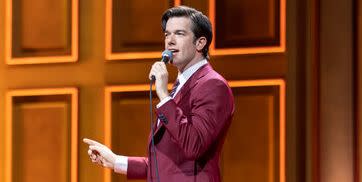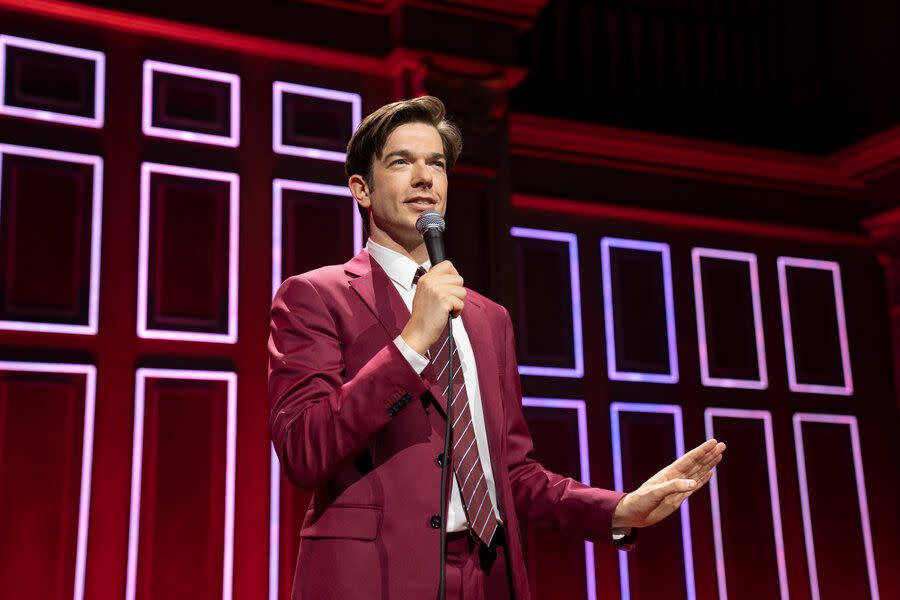John Mulaney's 'Baby J' Doesn't Dig Deep Enough
- Oops!Something went wrong.Please try again later.

In John Mulaney's new Netflix comedy special, Baby J, which is stylishly directed by Alex Timbers, we hear the beloved comedian before we actually see him. Mulaney is just out of frame when he makes an earnest confession: “I’ll be fine as long as I get constant attention.” The camera then zooms in and rotates around Mulaney, dressed sharply in a periwinkle suit, as he explains how—as the youngest of the three children—he never got enough attention. The clever camerawork suggests that Mulaney is most comfortable on stage. And when he’s deprived of an audience? Well, he just doesn’t know what to do with himself.
If you’re aware of Mulaney’s highly publicized relapse in 2020 and subsequent two-month stint in rehab, it’s obvious what’s happening here: Mulaney and Timbers are offering up this snazzy introduction, in part, as an explanation for those events. But for those who weren’t aware of Mulaney’s eventful year—and for the comedian's diehard fans who were pretty shaken up by his subsequent divorce—he promises to elaborate. “OK, here's what happened,” he calmly states, right before the opening credits roll.
Unfortunately, what comes next isn’t a thoughtful examination of the various factors that led to Mulaney bottoming out among, to hear him tell it, a boatload of empty eight ball baggies. Nor is it an insightful explanation of the many head-spinning changes he made post-rehab: unexpectedly divorcing his wife, Anna Marie Tendler, starting a new relationship with Olivia Munn, and becoming a father, just to name a few. Baby J is simply an hour’s worth of jokes and stories about Mulaney’s desperate addiction to cocaine, Adderall, Xanax, Klonopin, and Percocet—or as he refers to it in a smart, Boston-friendly joke, “a Providence special.”
To be clear, there is some great material in Baby J, including some audience work with an 11-year-old named Henry that is so good you’d be forgiven for wondering if Henry was planted and the entire bit was pre-planned by his parents, who happen to be on Mulaney’s payroll. That’s how smooth the execution of this off-the-cuff material was. In reality, Mulaney clearly has qualms about performing this material in front of his young fan and finds devastatingly funny ways to refer back to him throughout the show.
Baby J also features some great, unapologetic stories about the lengths Mulaney went to fuel his addiction, including an agonizing tale in which he visits a shady jewelry store and pays $12,000 to re-purchase a $6,000 watch he just sold. It is so infuriatingly stupid, you’ll want to pull your hair out. Not since Richard Pryor’s Live on the Sunset Strip has a mainstream comedian described their addiction in such brazen detail. I, for one, am here for it. Too often, unconsciously or not, we expect those who go to rehab to discuss the experience with an air of solemn gratitude, repeating daily gratitudes for their sobriety. I would imagine that must feel like a lot of pressure—especially if, as Mulaney hilariously describes, they had no interest in going to rehab in the first place.
But as anyone who has listened to a friend recount their recent acid trip could tell you, how stupid you are on drugs is nowhere near as interesting, illuminating, or—in the right hands—funny as the before and after the bender. That is the real stuff of life. What Baby J makes clear is that Mulaney hasn’t quite figured those parts out yet.

So, in the meantime, Mulaney is relying on some old favorites from his very refined bag of tricks, like zany impressions of characters that loom large in his frightful, funhouse imagination. In Kid Gorgeous, it was Detective JJ Bittenbinder, the midwestern cop who ran the anti-drug program at Mulaney’s middle school. In Baby J, it's the intervention specialist his friends hired to help cart him off to rehab, the nurse who woke him up during detox, and the girlfriends of the guys he and his buddies used to “Hey Mister” outside of gas stations when they were too young to buy alcohol.
Mulaney performs these impressions in a more subdued and haggard style than he used to, and the difference is jarring at times. It’s hard to shake the feeling that some of his old tricks might not work for stand-up anymore. This is especially true of the song and dance tidbit he does at the top of the show to recap the last few years of his life and address the elephant in the room: “You know what I mean. We all quarantined. We all went to rehab and we all got divorced and our reputation is different now. No one knows what to think.” It’s funny, kinda, but it leaves the audience hanging. An acknowledgement, when what we really want is an exploration.
Mulaney’s self-awareness may only be skin-deep right now, but there are small, promising flashes of insight in Baby J, like when he talks about his need to be liked and his obsession with attention. It proves that Mulaney is capable of more and better material. He just needs to keep learning about himself.
You Might Also Like

